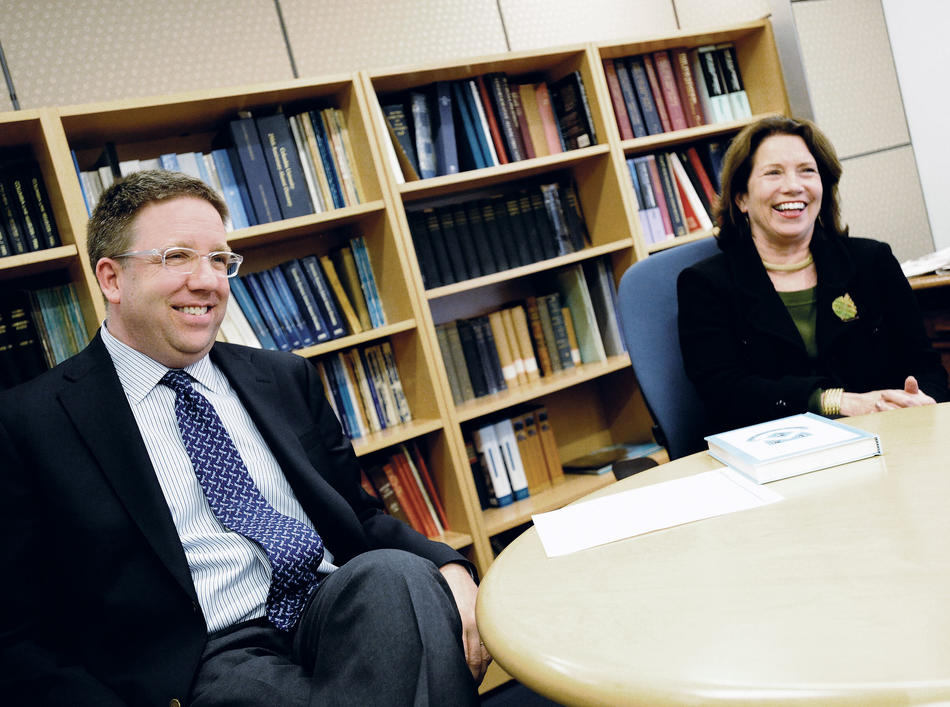Fred Van Sickle has been named executive vice president for university development and alumni relations, effective January 1.
In his new role, Van Sickle directs the Office of Alumni and Development, which supports a wide range of activities aimed at engaging alumni in the life of the University and raising money to advance Columbia’s mission.
Van Sickle succeeds his longtime colleague and mentor Susan Feagin ’74GS, who has served as executive vice president since 2002 and is credited with having successfully overhauled Columbia’s alumni outreach and fundraising operations. She will remain at Columbia as a special adviser to President Lee C. Bollinger.
Van Sickle served as vice president for university development under Feagin. They both came to Columbia in 2002 from the University of Michigan, where they had worked for Bollinger when he was president of that university.
At Columbia, Feagin and Van Sickle have led one of the most successful fundraising efforts in the history of higher education: The Columbia Campaign has raised roughly $4 billion since 2004 and has recently been expanded with a goal of raising $5 billion by the end of 2013. During their tenure, donors have given the University more than twice as much money than in the previous eight years.
Feagin also helped to create a renewed sense of community among graduates of the entire University. She oversaw the creation of the Columbia Alumni Association, a worldwide umbrella organization for all University alumni; the opening of the Columbia Alumni Center at West 113th Street; and the relaunch of Columbia Magazine. She also coordinated programs surrounding Columbia’s 250th anniversary celebration in 2004.
“Susan is admired by her colleagues and staff for her intelligence, warmth, sense of humor, determination and patience, and grace in every situation,” says President Bollinger. “The results she has achieved are remarkable by any standard.”
Says Feagin: “When Fred and I came to Columbia, the goal we shared with Lee was to create the sort of robust alumni and development program that this University deserved, but which hadn’t existed in a long time. The response we’ve gotten from alumni and friends of Columbia has been incredible, both in terms of their participation in activities, and, of course, in their giving. There’s an energy and momentum now that I know Fred is going to push forward.”
Feagin worked at Columbia twice before her latest stretch: immediately following her graduation in 1974 from the School of General Studies and again from 1982 to 1987, when she led fundraising efforts for the Arts and Sciences. She received the School of General Studies’ Owl Award in 1998 for her years of alumni volunteerism.
As a special adviser to Bollinger, Feagin will work on projects related to alumni relations, development, and other University matters. Among her plans, she says, is to reach out to alumni volunteers working on the Columbia Campaign, such as members of the various school-based dean’s councils, to hear their suggestions for making the volunteer experience “more enjoyable, productive, and rewarding.”
Van Sickle has held leadership positions in alumni relations and development at several institutions of higher education, including at his undergraduate alma mater Lake Forest College, where he was vice president for alumni and development and secretary of the college from 1995 to 2001, and at Princeton, where he was director of principal gifts from 1990 to 1994. Van Sickle earned his master’s degree in education from Harvard and his doctorate in education from the University of Pennsylvania.
One of his goals as executive vice president, he says, is to further encourage a sense of alumni connection and commitment at Columbia, across all of its schools.
“Columbia faculty, alumni, and students offer so much to the world, whether by curing disease, finding new solutions to global issues, or creating great art,” he says. “It’s a privilege for me to support their extraordinary work by amplifying the pride and connection that alumni feel to what’s happening here. Today, more alumni are taking part in the life of the University than ever before, and I’m going to work to make sure this continues.”



